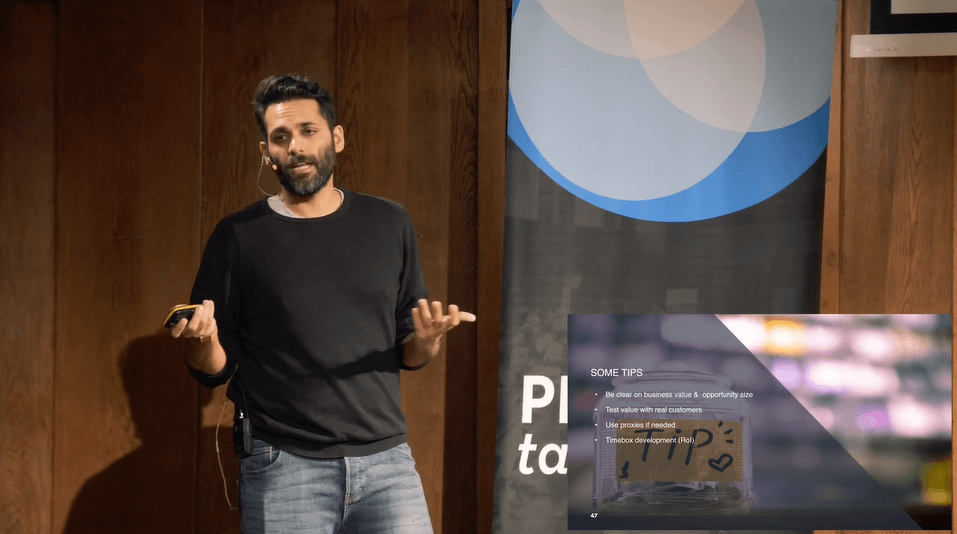In her keynote session at #mtpcon London 2022, Namrata Sarmah, Chief Product Officer at INTO University Partnerships and former Senior Director of Digital Product Management at Paramount, looks back at lessons learned from her wide-ranging product career, sharing tips and techniques to help you grow and develop at any level.
Watch this video or read on for key highlights from the talk.
- Experiment and take risks, do not be afraid to broaden your experience, whether you’re working at companies of different sizes and scales or across sectors
- Being hands-on in your role, regardless of seniority, can make you recession-proof and reorganisation-proof
- Don't be afraid to dream big, and build a network while you do – this will guide you forward and allow you to give back
Namrata begins by explaining how many of the steps she took in her career path differentiated her from those around her and in turn benefitted her career, offering new challenges, opportunities and experiences. While her MBA classmates took a more conventional route towards management and consultancy, Namrata shocked her peers by choosing product, an emerging role, prioritising ‘long-term gains, over short-term profit’.
Starting out as product manager at Truphone (2012), a telecommunications business in a highly regulated sector, she learned that ‘the most complex products teach you the most’. She reported to inspiring leaders at Antenna International (2014), before joining Babylon Health (2016) as Head of Product, in her first leadership position. While Namrata was among the first product people in a team where roles and responsibilities were undefined, ‘we all knew it was a great mission’, she says.
With each career move made, ‘my focus has always been on the impact […] it's never about how many people are managed, or even what job title I have’. Often this involved being open to experimenting and looking for opportunities in new sectors, working on products or at companies of different sizes, each time taking a risk; ‘I don't think you will be rewarded enough unless you take risks in life’ she says.
She moved to Paramount (2017) and then to iPlato (2020), which was later acquired by Houma. Namrata explains how humbling it was to work alongside medical professionals and how exciting it is ‘to be part of the process where you’re selling a company’. In 2022, Namrata started as Chief Product Officer at INTO University Partnerships, which she describes as an enterprise-level organisation looking to transform into a digital-first company, a challenge she ‘couldn’t say no to’.
‘I don't know what comes next’, Namrata says, noting that throughout her career, many of the next steps she took were accompanied by investment in study across a variety of subjects, including an Executive Programme at the University of Cambridge focusing on strategic management and a residential programme at Harvard Business School on Global Leadership.
Things done right
‘I'm very critical about myself, always’, Namrata says, describing the challenge of assessing what’s gone right in her career. The first thing, she says, is being active in the product and tech communities; attending meetups, making product connections across LinkedIn and networking. Investing in herself is something she’s done throughout her career, taking courses, reading books, and upskilling through training or coaching programmes, ‘not every company will invest in you,’ she says, ‘I think it's your own duty to your career’.
In her work, Namrata has always remained hands-on: ‘I like to be 100% sure about what my product is up to because I think that gives you the sense of accountability’. Plus, understanding and owning a division between strategy and execution is key, she says: 'There is no point in the strategy if you can't execute it right'.
Gaining a breadth of experience by working in B2C and B2B businesses, in startups, SMEs, corporations and in multiple sectors, has allowed her to learn fast and face new challenges, ‘if you can handle the complex sectors, you can easily do the other ones. So I always try to go through complex problems’.
Additionally, she recommends working on transformations, explaining that taking a ‘non-tech, non-product company to a product-led organisation’ is demanding, as is delivering new market innovations and being the first to do something, disrupting a whole industry or market, ‘my advice is to probably try doing both because, there are different learnings from each of them’.
Team management vs individual contributor
Unpacking questions product people regularly face as to whether to move into management or remain an individual contributor, Namrata explains how becoming an individual contributor, provided you’re a specialist or have that ‘superpower’ in a certain field, can be beneficial and allow you to shine in an organisation. She describes how organisational structures are becoming flatter, with fewer management layers and hierarchies, and therefore being an individual contributor can make you ‘recession-proof or reorganisation-proof’.
For product people looking towards management roles, Namrata emphasises the importance of understanding how ‘there are managers, bosses, and leaders’, and recommends people should focus on leadership and ‘ensure that they build high-performance teams that are judged by the impact and not by their size’. Good leadership, she says, can ‘truly galvanise product teams’ and result in superior products.
Namrata points to 3 books that have helped her develop as a leader; Discover your true north written by Harvard Business School Professor Bill George, Empowered by Marty Cagan, and Trillion Dollar Coach by Eric Schmidt, Jonathan Rosenberg and Alan Eagle.
Startups vs corporations
Namrata explains how, when deciding between startups and corporations, it’s not necessarily an either-or – something she learnt from moving into different fields at companies of different sizes. ‘The kind of job titles, accountabilities, even career growth can be very different’ at scale, Namrata says, explaining how ‘experience in both is an asset’.
Large corporations are increasingly looking for startup experience and ‘that startup mentality’, while startups often desire candidates that come from established businesses, ‘who can introduce new processes and […] some sort of structure and discipline in startups’.
When looking to transition, be aware that you may encounter hiring managers who are risk-averse and choose not to pursue candidates that have not worked in a similar business environment. To those hiring, Namrata stresses how ‘being open to diversity of experience’ will often reap huge benefits, pointing to how ‘startup culture and Lean principles can be a game changer for large organisations’.
Namrata recommends The Lean Startup by Eric Ries, David and Goliath by Malcolm Gladwell, and Good to Great by Jim Collins, 3 books she found ‘very very useful, I would say, in defining my own career path’.
Career pivots and breaks
‘A career break is not a taboo’, Namrata says, explaining how in the modern workforce many employees have taken career breaks or changed careers altogether. She recommends being ‘clever’ about your breaks and considering investing in them to ‘work on some side hustle, maybe passion projects, business ideas’, a skill, language, or to engage in the community – something she did during maternity leave.
Changing careers can be empowering, Namrata says, explaining that, while it does come with financial risks, pivoting can be ‘a true blessing if you prepare it in the right direction and to the right sector’. She recommends knowing your end goal, considering what you want to achieve and understanding why you are making the shift. Then, she says, ‘you can change without any reservations’.
Work-life integration
Work does not need to come at the expense of life, Namrata says, referencing her own career, where she has found ways to integrate her work and life without sacrifice. She recommends building a network around you, whether professional or personal, with people who will support you. Having a mentor, she says, is ‘probably more important and useful than having a coach […] mentoring is very powerful’ not only on the receiving end as a mentee, but also by giving back as a mentor.
Having a plan is fundamental, Namrata says, ‘You really need to follow a plan and have a roadmap of life just like how you have a product roadmap as well’. Understanding where you’re going, as well as being able to delegate, (‘an art in itself and not everybody can delegate well’), allows you to balance your work life better, she says, going back to the importance of building a high-performance team because ‘you have people around you who you can trust’.
Lastly, Namrata recommends dreaming big, ‘I have this feeling: if you dare to dream, you can actually get there’. She references a venn diagram she follows that integrates and emphasises the importance of work, family, health, wellness and also giving back to and connecting with the community.
Outside of the day job
‘I’ve talked a lot about work, work, work’, Namrata says, and closes her keynote by introducing some of the communities she’s founded world outside of her day job: in 2017, while on maternity leave, Namrata founded the Career Mums Club on Facebook, a ‘very diverse community’ of over 2000 working mums in London. During the first lockdown in 2020, she started a Women In Product group bringing together ‘aspiring female product professionals’, and throughout her career she has also been involved in mentoring and is now helping aspiring product leaders. ‘I think it’s very important as a CPO, because I'm so busy 10 hours, 12 hours a day with my day job. I need something on the side, apart from my child … of course I need something else also, I think, to keep me going!’
There's more where that came from!
Explore more #mtpcon London 2022 content or use our Content A–Z to find even more product management insights.






